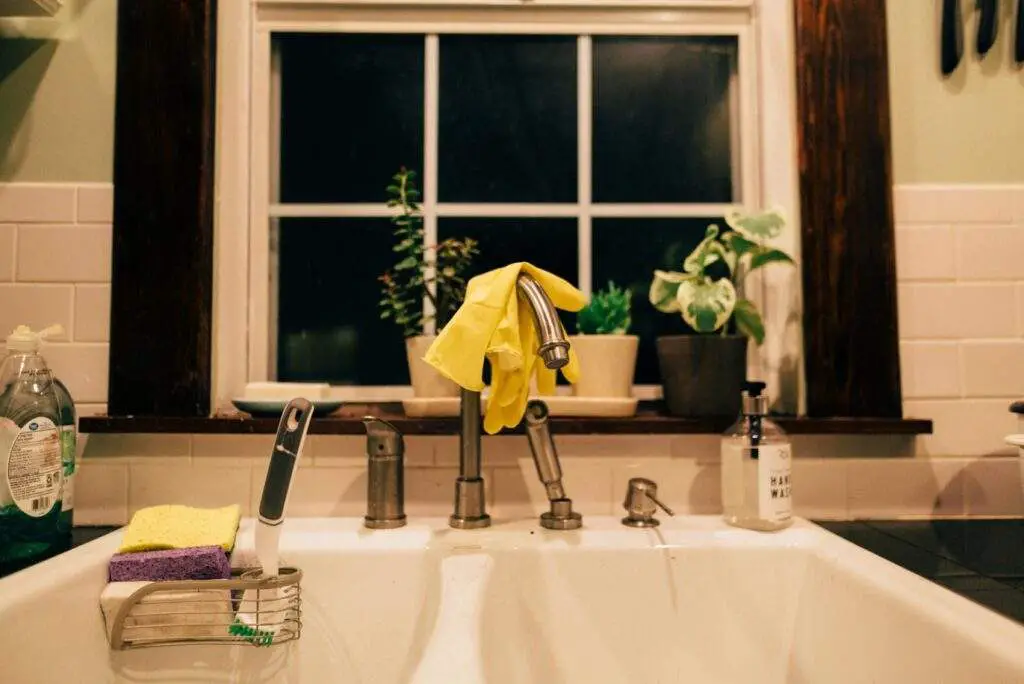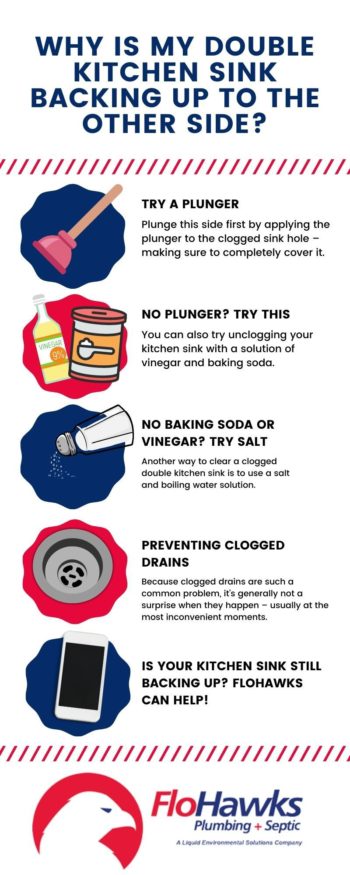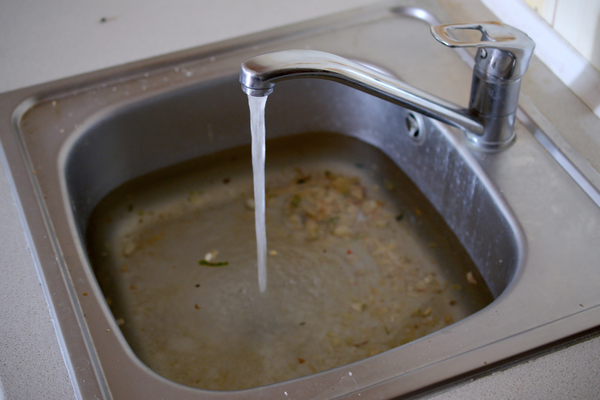Kitchen sinks commonly clog due to accumulated food particles, grease buildup, or foreign objects. Inadequate water flow and small pipe diameters can also contribute to frequent blockages.
Dealing with a clogged kitchen sink can be a persistent issue for many homeowners. It’s a frustrating problem that interrupts daily chores and can lead to unwanted odors and potential water damage if not addressed promptly. The reasons behind a clogged sink are often related to everyday kitchen activities.
Whether it’s from washing dishes that leave food scraps and oils behind, or from disposing of substances that should not enter the drainage system, the result is the same: a blockage that prevents water from flowing freely. Understanding the common causes of sink clogs is the first step towards preventing them and maintaining a clear and functional kitchen sink. Regular maintenance and mindful sink usage are key to keeping those pipes clear and fully operational.

Common Causes Of Kitchen Sink Clogging
Is your kitchen sink keeps clogging? You’re not alone. Clogged sinks disrupt our daily routines and create unwanted hassles. Let’s dive into the reasons behind this pesky problem.
Improper Food Disposal
Not everything is garbage disposal-friendly. Foods like rice, pasta, and coffee grounds swell with water. They can cause blockages over time. Always use a strainer to catch solids.
- Rice and pasta
- Coffee grounds
- Eggshells
- Non-food items
Grease And Oil Buildup
Grease is a sink’s worst enemy. It sticks to pipes, hardens, and traps other waste. To prevent clogs, pour oil and grease into a container, not down the sink. Hot water won’t stop grease from hardening.
Tips:
- Use a container for grease
- Wipe dishes before washing
Foreign Objects In The Drain
Even small items can lead to a sink keeps blocking. Jewelry, bottle caps, or toys should stay far from the sink. Install a drain guard to catch these objects.
| Item Type | Risk Level |
|---|---|
| Small toys | High |
| Jewelry | High |
| Bottle caps | Moderate |
Impact Of Clogging On Plumbing System
The Impact of Clogging on Plumbing System is significant. A kitchen sink keeps clogging, causing problems not just at the surface but deep within the plumbing network. This leads to a series of issues that affect the overall efficiency and health of your home’s plumbing system.
Slow Drainage
When a kitchen sink keeps clogging, water drains slower than usual. This is a clear sign that a blockage is forming somewhere in the pipes. Slow drainage can lead to water pooling in the sink, which creates an inconvenient delay in kitchen activities.
Foul Odors
Clogs often trap food particles, grease, and other debris. As these items decompose, they release unpleasant smells. Regular clogging means a continuous presence of these odor-causing elements. Foul odors then become a persistent problem, making the kitchen an unwelcoming place.
Risk Of Pipe Damage
Persistent blockages exert pressure on pipes. Over time, this can lead to cracks or even bursts, resulting in costly repairs. The risk of pipe damage increases with every instance your sink keeps blocking. It’s crucial to address clogs promptly to prevent severe damage to your plumbing system.
| Issue | Consequence |
|---|---|
| Slow Drainage | Water pooling, delayed sink use |
| Foul Odors | Unpleasant smells, unwelcoming kitchen |
| Risk of Pipe Damage | Cracks, bursts, expensive repairs |
- Regular maintenance prevents clogs.
- Proper disposal of waste keeps sinks clear.
- Immediate action saves plumbing systems.
Preventive Measures For Kitchen Sink Clogging
Is your kitchen sink keeps clogging? Here are some easy steps to prevent this issue. These steps will keep your sink clear and functioning well.
Proper Food Disposal Techniques
Being mindful of what goes down your sink is key. Here are the best practices:
- Never pour oils or grease down the drain. They solidify and cause blockages.
- Scrape food scraps into the bin before washing dishes.
- Use a compost bin for organic waste.
Regular Cleaning And Maintenance
Regular upkeep prevents build-ups that lead to clogs. Follow this simple schedule:
- Weekly, flush your sink with hot water to dissolve fats and oils.
- Monthly, use baking soda and vinegar to clean and deodorize the drain.
- Inspect and replace any worn-out pipes or fittings annually.
Use Of Drain Strainers
Drain strainers catch debris that could block your sink. They are essential:
| Type | Function |
|---|---|
| Mesh Strainer | Catches small and large particles |
| Perforated Strainer | Good for larger particles |
Choose a strainer that fits well and clean it regularly.
By following these steps, your sink keeps blocking less often. Your kitchen remains cleaner and more efficient.

Credit: blacktieplumbing.com
Diy Solutions For Clearing Clogs
Are you tired of asking, “Why does my kitchen sink keep clogging?” You’re not alone. Many face this common household issue. But there’s good news! There are DIY solutions to tackle those stubborn sink clogs. Let’s explore some effective methods to get your water flowing smoothly again.
Using A Plunger
A plunger can be your first line of defense against a clogged sink. Here’s how to use it:
- Fill the sink partly with water to cover the plunger.
- Place the plunger firmly over the drain.
- Pump vigorously to create suction.
- Repeat until the water drains swiftly.
Natural Drain Cleaning Methods
Harsh chemicals are not always needed to clear a blockage. Try these natural methods:
- Baking soda and vinegar can break down clogs. Pour half a cup of each down the drain, wait 15 minutes, and then flush with hot water.
- Hot water alone can also help. Boil a kettle and pour it down the drain to dissolve greasy buildup.
Removing And Cleaning The P-trap
Sometimes, the clog is in the P-trap. Here’s a simple guide to clean it:
- Place a bucket under the P-trap to catch water and debris.
- Unscrew the P-trap connectors by hand or with pliers.
- Remove the P-trap and clean it thoroughly.
- Reattach the P-trap and test the sink.
When To Seek Professional Help
Kitchen sinks can be the workhorses of your home. Sometimes, they start acting up. Your kitchen sink keeps clogging, and you’ve tried everything. It’s time to consider professional help. Knowing when to call in the experts can save you time and prevent further damage.
Persistent Clogging Issues
If your sink keeps blocking no matter what you do, it’s a sign. Over-the-counter solutions might not cut it. If plunging and drain cleaners have failed, there could be deeper issues. Tree roots, severe pipe buildup, or foreign objects might be to blame. These problems need a professional’s touch.
Foul Smells Despite Cleaning
Do bad odors linger even after cleaning? Don’t ignore them. These smells can mean trapped food or buildup deep within your pipes. It’s not just unpleasant; it can signal a blockage. A professional plumber can get rid of the gunk and the stench for good.
Visible Signs Of Pipe Damage
Check under the sink. Do you see leaks or damage? Pipes can corrode or get damaged over time. Leaks can cause mold and structural issues. When you see visible damage, it’s time to call a professional.
Remember: A kitchen sink that keeps clogging is a cry for help. Experts have the right tools and experience. They can fix your sink and restore peace to your kitchen.

Credit: flohawks.com
Benefits Of Addressing Clogging Promptly
Dealing with a kitchen sink that keeps clogging can be frustrating. But, addressing the issue promptly offers significant benefits. Ignoring a clogged sink leads to bigger problems. Let’s explore why it’s crucial to act fast.
Preventing Costly Repairs
Immediate action can save your wallet. Regular clogs can damage pipes over time. This damage may require expensive repairs or even replacements. By tackling clogs early, you avoid these costs.
Maintaining Hygiene In The Kitchen
A clogged sink becomes a breeding ground for bacteria and bad odors. Quick fixes ensure your kitchen remains clean and hygienic. This creates a healthier environment for preparing food.
Extending The Lifespan Of Plumbing Fixtures
Your sink and pipes can last longer if you maintain them well. By preventing clogs, you extend the lifespan of these fixtures. This means less hassle and more savings in the long run.
Environmental Impact Of Clogging
Kitchen sink keeps clogging and it’s not just an inconvenience. It affects our planet too. When your sink keeps blocking, it’s a sign. A sign that we might be harming our environment without knowing it. Let’s explore how.
Contamination of Water Sources
Contamination Of Water Sources
Blocked sinks can lead to serious water pollution. When water can’t flow freely, it stagnates. This creates a home for bacteria. Grease and chemicals from clogged pipes can seep into the ground. They end up in our rivers and lakes. This table shows common pollutants from clogged sinks:
| Pollutant | Source | Effect |
|---|---|---|
| Grease | Kitchen waste | Blocks oxygen in water |
| Chemicals | Cleaning agents | Harms aquatic life |
Impact on Local Ecosystems
Impact On Local Ecosystems
Local ecosystems suffer when sinks block. Animals and plants rely on clean water. A clogged sink can disrupt this. Waste materials can change the water’s pH. This makes it hard for wildlife to survive.
- Change in pH levels affects fish breeding.
- Plants can’t grow in polluted waters.
Waste Of Resources
Every time your sink blocks, resources go to waste. Water is precious. A clogged sink needs more water to clear. It also needs chemicals to unclog. Both are a waste of our planet’s resources. Here’s a list of wasted resources due to clogged sinks:
- Clean water
- Chemical cleaners
- Professional plumbing services

Credit: www.applewoodfixit.com
Conclusion And Final Thoughts
Kitchen sink issues can disrupt daily life. Understanding the root causes helps tackle them effectively. Let’s sum up key takeaways for a clog-free sink.
Emphasizing The Importance Of Regular Maintenance
Regular upkeep is vital. It ensures smooth functioning. Think of it as health check-ups for your sink. Preventative care stops major clogs before they start. Here are maintenance tips:
- Clean drains weekly with hot water.
- Use baking soda and vinegar monthly to break down buildup.
- Inspect pipes annually for early signs of trouble.
Encouraging Responsible Disposal Practices
What goes down matters. Be mindful of waste disposal. Avoid pouring oils and food scraps down the drain. Here’s what you should do:
- Dispose of oils and fats in the trash.
- Use a sink strainer to catch solids.
- Compost food scraps when possible.
Highlighting The Long-term Benefits Of Clog Prevention
Preventing clogs saves time and money. It also spares you from stress. A clog-free sink means a happy kitchen. Here are long-term benefits:
- Reduced plumbing costs over time.
- Better pipe lifespan and performance.
- Peace of mind, knowing your kitchen sink keeps clogging at bay.
Follow these steps to keep your kitchen sink in top shape. Remember, your sink keeps blocking less with care and smart habits. Happy unclogging!
Frequently Asked Questions
Why Does My Kitchen Sink Keep Getting Blocked?
Your kitchen sink may get blocked due to food debris, grease buildup, or foreign objects obstructing the pipes. Regular maintenance and mindful disposal of waste can prevent clogs.
How To Stop A Kitchen Sink From Clogging?
To prevent kitchen sink clogs, avoid pouring grease down the drain. Use a strainer to catch food particles. Run hot water after each use to clear residue. Regularly clean the drain with baking soda and vinegar. Schedule annual professional cleanings to maintain clear pipes.
Why Does My Kitchen Sink Drain Back Up?
Your kitchen sink drain may back up due to clogs from food particles, grease buildup, or obstructed plumbing vents. Regular cleaning can prevent backups.
What Is The Most Common Cause Of Kitchen Sink Clogs?
The most common cause of kitchen sink clogs is the buildup of grease and food particles.
What Causes Kitchen Sink Clogs?
Common culprits include grease buildup, food particles, and non-dissolvable items like wipes.
Conclusion
Dealing with a stubbornly clogged kitchen sink can be a real hassle. Remember, prevention is key: avoid letting grease, coffee grounds, and large food particles go down the drain. For persistent issues, a professional plumber might be your best bet.
Keep your sink clear and your kitchen functional by tackling clogs head-on with these tips. Happy unclogging!

